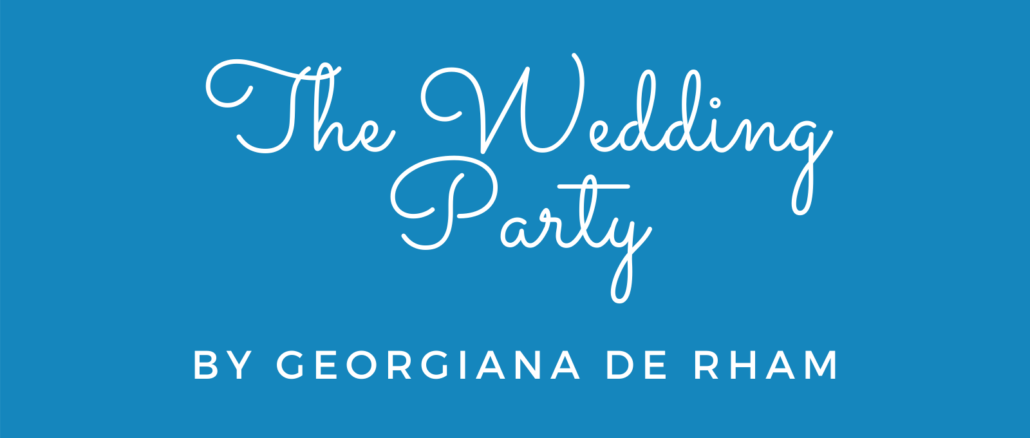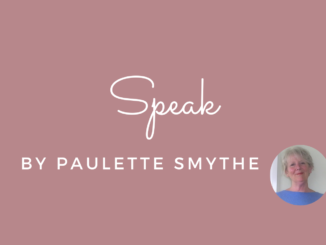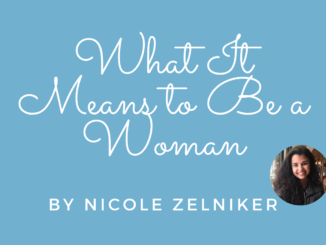
My mother’s first English word was “7UP Delicious,” which she learned while watching television with her four older sisters, and on her first day of kindergarten, she jumped out the window of the neighbor’s Volvo station wagon because she didn’t speak any English and everyone else in the car was blonde. At least, that’s how she remembers it – or at least, how I remember her telling it. Apparently, that act of defiance convinced my grandparents to let her stay home for a year, letting her adjust more gradually to life in America.
My blue-eyed father grew up only a few miles from my mother. He was also the youngest of a big family, with two older brothers and a sister and a big, rambling yellow house with a barn and a backyard and a host of old oil paintings featuring deceased relatives. His family had lived in New England for generations, and you could look them up in the Social Register. “That’s why Popo and Grandpa were okay with it,” my mom said to me once. “And they were okay with Uncle Jan because he was a doctor,” she added, referring to her third sister’s first husband, the only other white man in the family.
By the time my mom was old enough for high school, my grandparents had decided to enroll their daughters in private school, where as my mom put it, they were the only Asians in sight. Here, she met my dad, and they got married after college, and a little over a decade later, I was born with a shock of fluffy black hair and black eyes, both of which would turn brown over time. Shortly after that, my mom got a job in San Francisco, and to the chagrin of both sets of grandparents, we packed up and headed out west.
San Francisco was a whole new world for my East Coast parents, who couldn’t quite grasp the idea of only two seasons (foggy and less foggy, or somewhat green and mostly yellow), but for me, it was pretty much the only thing I knew, and after a grumpy few weeks of transition which are mostly recalled to me via family lore, I settled right in, and when I was old enough for kindergarten, my parents enrolled me in a private school a few blocks away from our pink stucco house on West Clay Park St.
There was a big Chinese population in San Francisco, and we lived near what we called “new Chinatown,” a few blocks populated by restaurants, Chinese markets, and a thriving Chinese American community. I attended an all girls school, and many of my classmates were Chinese or half Chinese, like me. Many of them spoke some Chinese, had a Chinese name in addition to their American name, or attended Chinese school in the evenings. I didn’t do any of these things – no Chinese language, no Chinese name, and definitely no Chinese school. I knew I was born in the year of the monkey, and I had a jade monkey charm that I treasured, but that was about it. I didn’t even look Chinese, and I was secretly jealous of my peers, especially those who had white fathers or mothers, like me, and still managed to look more Asian than I did.
“Why don’t I have a Chinese name?” I would pester my mother.
“Why do you want one?” She would retort. “That’s ridiculous! You’re American!”
“But you’re Chinese!” I fired back once.
“No,” she said, raising her voice, which she rarely did. “I am American.”
When my grandparents moved from Hong Kong to Lexington, Massachusetts, they worked hard for a full and seamless assimilation to American life, which was largely successful and marred only by a few remaining identifiers. For example, my mother doesn’t speak Cantonese, but occasionally, she can understand it, and when all my aunties are together, they call each other by the Chinese names for second sister, third sister, and so forth. While they grew up eating mainstream American food, like jello salad, Campbell’s soup casserole, and Howard Johnson hot dogs, they still visited Chinatown once a week as a family, and to this day, when we all get together for family reunions, we usually have a Chinese banquet. They vacationed in Martha’s Vineyard, like many white families, and my grandfather had them all fish off the dock to catch bluegill and eel. My grandmother would then freeze the bluegill and, as my mom recalls, they would live off it for most of the year, which is why to this day, my mom doesn’t like bluegill.
“Grandpa loved to fish and forage for berries and harvest things,” my mother told me once. “It must have been the Cantonese peasant in him,” referencing his childhood in a farming village in the Southern province of Canton. Martha’s Vineyard was a good fit for the family, as my grandfather fished and my grandmother played tennis and relaxed in the house, never being one for the beach. It was certainly better than New Hampshire, where they had spent a few summers before heading to the Vineyard.
“Why would you go there?” I asked my mom. “Popo hates the woods.”
“I don’t know,” she said, “probably because that’s what all the other Americans were doing.” Even if my grandmother had to suffer through a few summers in New Hampshire, my grandparents’ efforts were successful. To a nine year old me, my Mom was about as maddeningly American as one could get, and for all my pestering her about Chinese names and school and history, I never made it very far.
***
I can’t remember exactly when the tables turned, but as I got older, I lost my zest for my Chinese history, and grew more comfortable with my whiteness. Instead of fighting it, I leaned into it. It was easy, and comfortable. I looked white, just white with a tan, and I had plenty of white friends, and most of my teachers were white, and I started riding horses, which is a very white sport. Our family still ate at authentic Chinese restaurants fairly regularly in new Chinatown, and sometimes my mother and I would do our shopping at the Chinese market, hunting for bargains in crowded aisles, me eyeing the roast pigs hanging in the window. But overall, I lost my vigor to develop my Chinese identity, and I started worrying more about dance classes after school than Chinese classes.
As years passed, my distance from my Chinese-ness grew. I went to a prep school, and while I checked both “white” and “Asian American” boxes on my college applications, I decided to take French instead of Mandarin, and had summer jobs in high end horse barns where most people thought that if I wasn’t white, I was Latina. By the time I got to college, I had fully embraced whiteness and it embraced me right back. I took classes that focused on European and American history and language, I read books by white authors, I watched films with white actors, I had white friends, I ate culturally white food, and I dated a white boy. I was about as white as the paper I printed my essays on, casually strolling through a world catering to white people or, in my case, people who looked just white enough to fit in.
However, I couldn’t fully walk away from my Chinese heritage. Small things began cropping up for me. Our unit on Orientalism in a philosophy course hit a little too close to home. I thought about my Chinese cousin, an actress in Los Angeles, when we learned about the issues of racial representation and tokenism in a film theory class. I took it a little personally when my white friend blamed all the Asians for ruining the curve in our Calculus class. But I didn’t feel like I could really own those things – I couldn’t feel upset, and I couldn’t speak up – I was still that imposter Chinese girl from elementary school. I mean, I wasn’t really Chinese, I was white, wasn’t I? But that was the problem. I wasn’t actually white.
The summer after my sophomore year, my cousin Tim, my third auntie’s oldest child, got married. His wife, Megan, a beautiful, kind woman, was from western Massachusetts, and the wedding took place at her family’s home. I invited my white boyfriend, and we met up with my parents and carpooled out to the venue. All of my aunties and uncles were there, and almost all my cousins, as well as Tim’s father, who was Swedish, and his Swedish grandparents.
After the ceremony, we all sat at our assigned tables for dinner, and in a sea of white people, the two mostly Chinese tables stood out like sore thumbs, all that dark black hair shining like a racially charged beacon. As we picked at our salads, the father of the bride stood up to make a toast.
“Now I have to say,” he said, “we are SO thrilled to have Tim joining our family.” We all nodded and murmured. He then gestured at all the guests. “I mean, look at all this diversity Tim is bringing to our family!” More nodding and murmuring, but silence at my table. We looked around at each other, a bit confused.
“Diversity?” Whispered my mother. “I don’t see any Mexicans here!”
“Mom!” I hissed.
“I know how much you and Megan love Disney movies,” the father of the bride continued. “So Tim, I have a question for you today.” He gestured to his left, and one of the catering staff appeared, dressed in a gaudy turban and robe. Oh no, I thought to myself. Where is this going?
“Tim,” he continued, “you must promise me you will take good care of my daughter. I just have one question and I have to ask this genie here to help me out. I just want to make sure you’re an honorable prince like Aladdin and you’re not going to steal my Megan away to be one of your many wives and live in a harem in Arabia!”
My mom, aunts, and uncles looked horrified. We exchanged glances, confused. Was he seriously making a joke out of this? Everyone around us was laughing, and even my dad and my boyfriend had mustered a chuckle, even though they both seemed pretty uncomfortable. One of my aunties got up from her table and came over to ours, whispering inaudibly to her sisters. This is not right, I thought. First of all, Tim is Chinese and Swedish, not Arabic. Can’t he at least get the origin country right? I felt like my recent academic studies of Orientalism were coming alive, unfolding before my eyes in a real life demo. In class, it had felt like a distant, musty, theoretical philosophy, but right now, it felt acute, and alive.
“GENIE!” Bellowed Megan’s father. “Where do you come from, Genie?”
“Fah Fah Away,” said the genie in a thick Boston accent (the genie was white).
“Genie, is this man an honorable man, or will he steal my daughter away to a harem in the East?”
“He is an honorable man,” said the genie, and departed stage left. The wedding guests erupted in applause. My table did not laugh or clap, instead, we looked at each other in confusion. Then I looked at the rest of the guests laughing. The white guests. And in that moment, I lived the phrase “white people just don’t get it.” And I felt like a big stone had dropped through my stomach.
“Did that really just happen?” Someone said. I don’t remember much more about that toast, or the ones that followed, or the first dance, or any of the other ceremonial moments of the wedding party. I do remember having a fun time with my cousins after dinner, and dancing with my boyfriend, who wore a pinstriped suit, and how my mom made friends with the bride’s aunts from Rochester, who were the misfits of the family and wore leopard print, and I remember getting in the car to go home.
“What happened with that toast?” I said to my parents. “That was insane. That was so racist.”
“That was awful,” said my mom. “I can’t believe that happened.”
“How can he have thought that was okay,” I said in the backseat. “We literally just learned about Orientalism in school. Tim is not even Arabic!”
“I don’t know, honey,” my Mom said. “Obviously he’s ignorant.”
“I don’t know,” said my dad, “I guess I could see how some people would think it was funny. The genie’s Boston accent was what did it for me.”
“I could see how it could be funny for some people too,” said my boyfriend.
“Are you kidding me?” I said. “That was not funny!” And we talked about other things for the rest of the ride home.
***
In the summer of 2020, when racial protests burst out across America, I did a lot of uncomfortable reckoning with my own identity, a process that won’t be completed for a long time, if ever. As someone who has easily masqueraded as white her whole life, and benefited off of our white dominated world, I have a lot of guilt and shame about my complicity in our country’s racism. In many ways, I am a white person who “just doesn’t get it,” but I also have my own knowledge and vocabulary about race that I don’t think I would have if I was truly white. I know people called my mom “Chink” on the schoolbus, and I know my grandparents assimilated to protect their family, to fit in and succeed. I imagine that’s why my mom didn’t send me to Chinese school or give me a Chinese name. I imagine she thought that I’d be better off just being American. In a way, she was right. Doors have always opened for me. I’ve been comfortable. I’ve felt safe and validated. My stories have been told. Besides those few years in elementary school where I felt I didn’t look Chinese enough, I’ve always been surrounded by people that basically look like me, sound like me, and talk like me. But there’s another part of me that still wants to learn Chinese and look Chinese. The part of me that knows I’m not white even though I look white. The part of me that understands implicitly that what happened at the wedding was a racist act. The part of me that understands that the white people who laughed at the joke simply didn’t understand how hurtful it could be, or what it’s like not to be white. That’s the issue. I’m white, and I’m not white. I’m on the divide. And sometimes it feels like being torn in two.
Georgiana de Rham
Georgiana de Rham is a young writer currently living in Burlington, Vermont. She has lived in many parts of the United States and often draws inspiration from her experiences working, living, and traveling around the country. She enjoys volunteering in her local community, advocating for workers rights and food justice, and long distance running.


